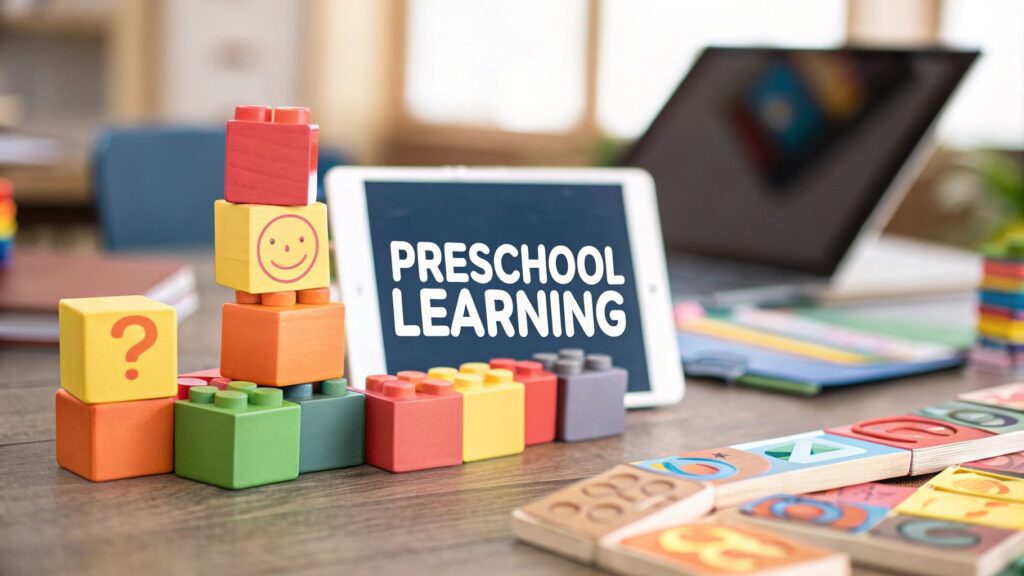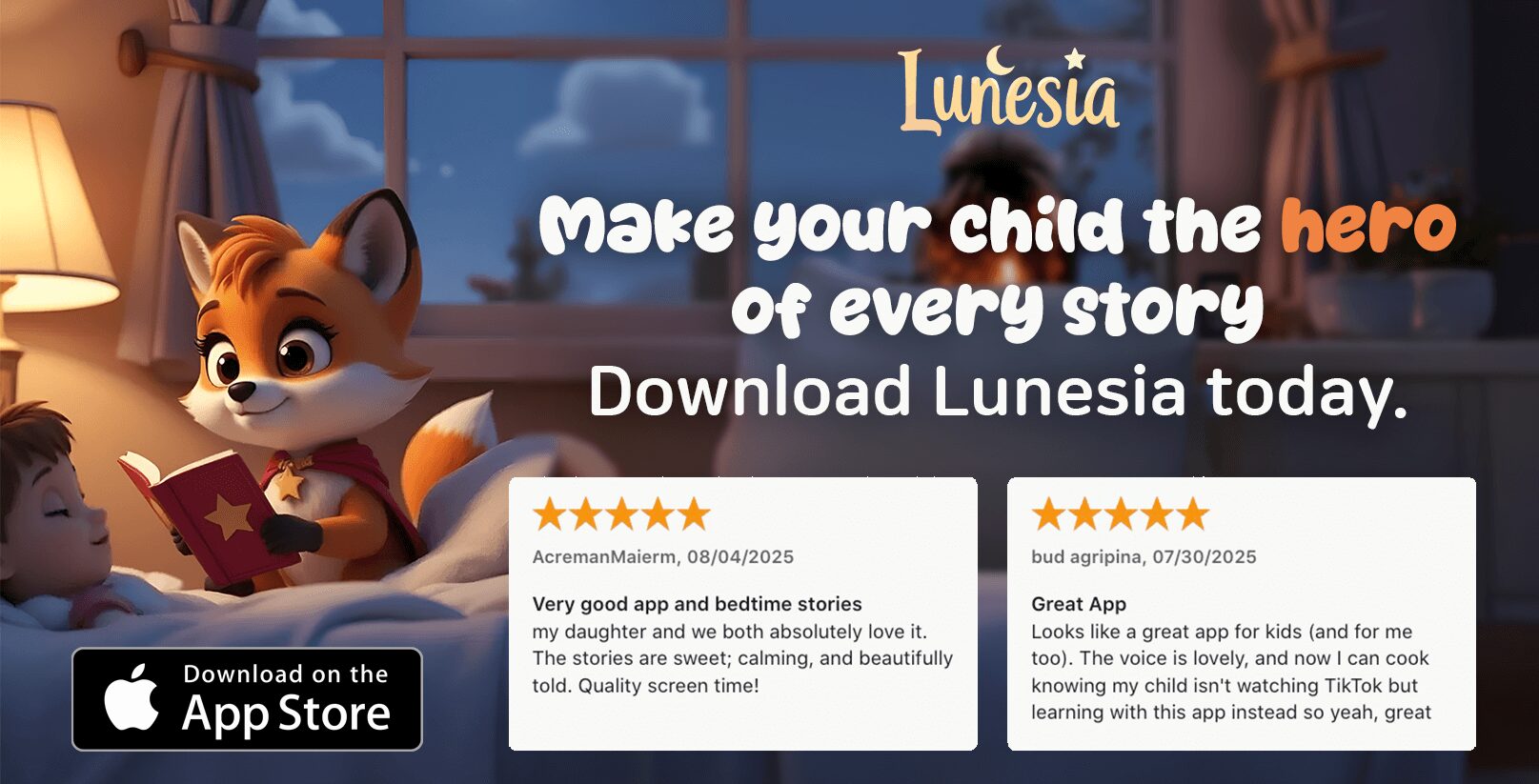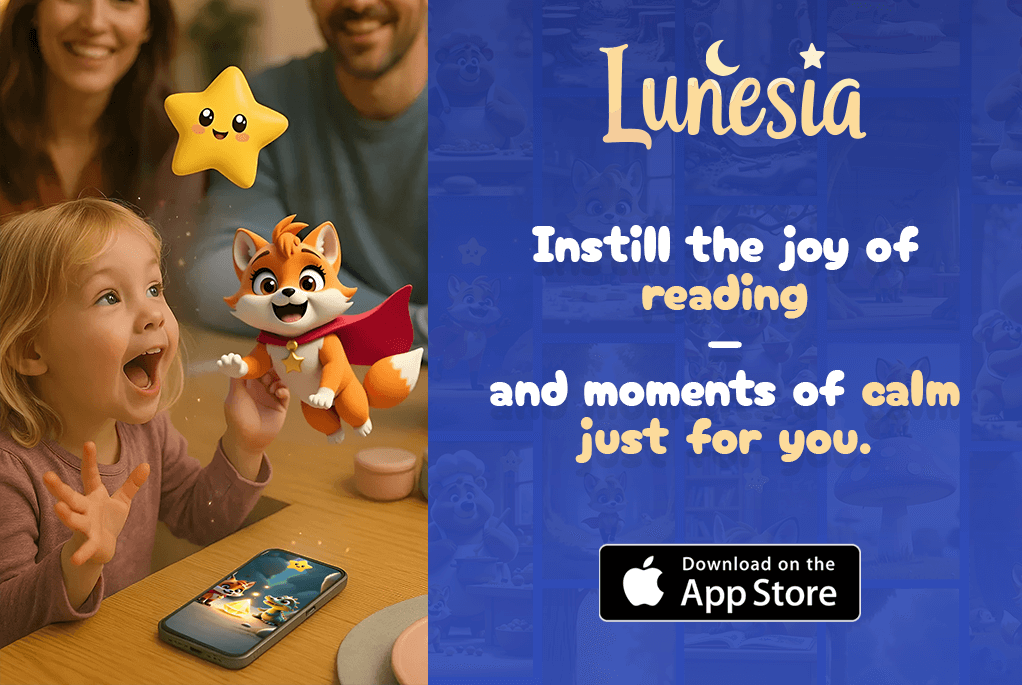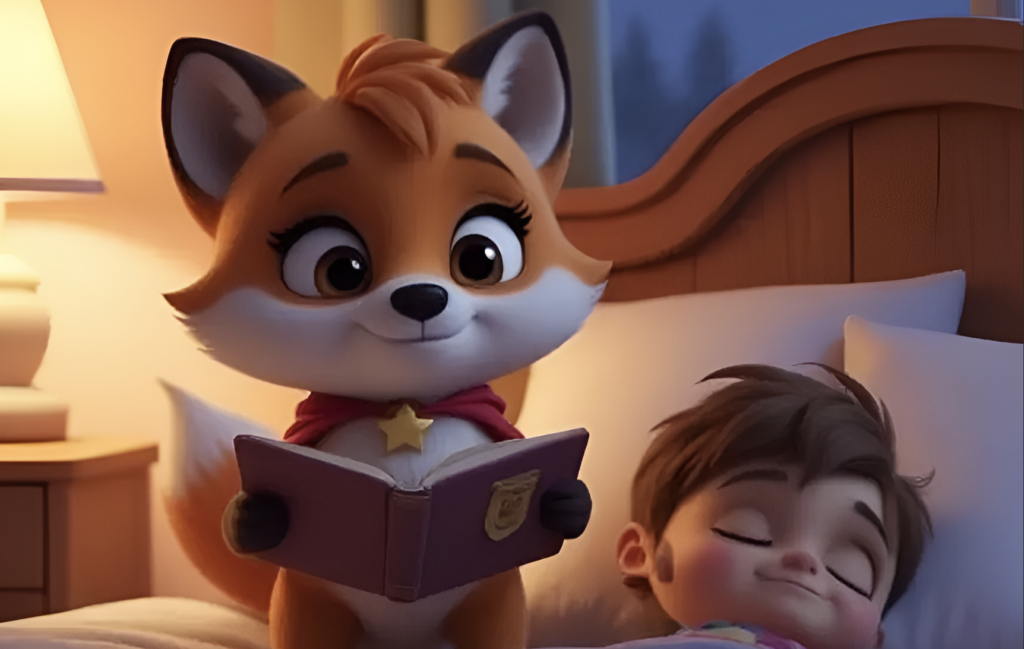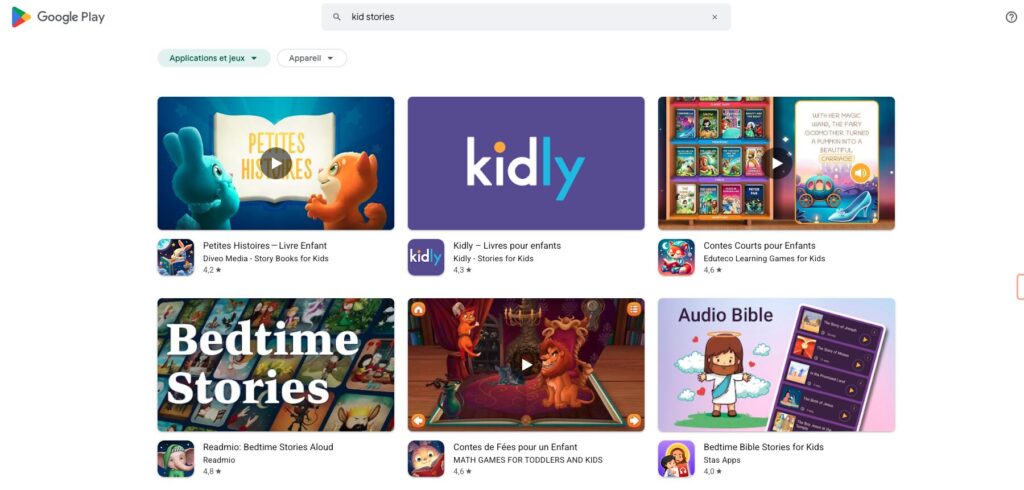Ever feel like you’re drowning in a sea of brightly colored apps, all promising to make your preschooler a genius? You’re not alone. Finding the best educational apps for preschoolers can feel like searching for a needle in a digital haystack. But what if screen time could be more than just a way to keep them busy? What if it could be an active, mind-building adventure that also gives you a guilt-free moment to breathe?
Think of these apps less as passive entertainment and more as a digital playground for the mind. The best ones lean into play-based learning, transforming fundamental skills like literacy and emotional intelligence into the kinds of fun, engaging journeys that feed a child's natural curiosity.
Navigating the Digital Playground for Your Preschooler
Have you ever found yourself scrolling through the app store, feeling that familiar mix of hope and overwhelm? It’s a jungle of cute characters and bold claims, but the real question echoes in your mind: "Will this actually teach my child something valuable, or is it just digital candy?" If you’ve felt that pang of uncertainty, you’re in good company. It's like standing in a grocery store, trying to pick a genuinely healthy snack while your child is mesmerized by the sugary cereals at eye level.
So, how do you spot the difference between an app that simply distracts and one that genuinely enriches? A great educational app doesn't just ask your child to mindlessly tap a screen. It invites them into a world where they can explore, experiment, and make choices that matter. This is where real learning happens, forging strong neural pathways that last a lifetime.
From Passive Viewing to Active Adventure
Think about the last time your child watched a cartoon. They were glued to the screen, but were they truly engaged? Now, imagine an app where they don't just watch the story—they get to shape it. This is the incredible shift that turns screen time into a powerful tool. In apps like Lunesia, your child becomes the hero of their own journey. When a character is scared, your child decides how to help them be brave. These aren't just bedtime stories; they're engaging, value-rich adventures that teach kindness, courage, and problem-solving.
This demand for higher-quality content is reshaping the entire industry. The preschool app market is booming, valued at an incredible $280.73 billion in 2024 and projected to climb even higher. This isn't just about more screens; it's driven by parents like you who are seeking better, safer, and more meaningful digital experiences. You can read more about the trends in the preschool app market to see this shift in action.
The infographic below highlights just how integrated these apps have become in family life.
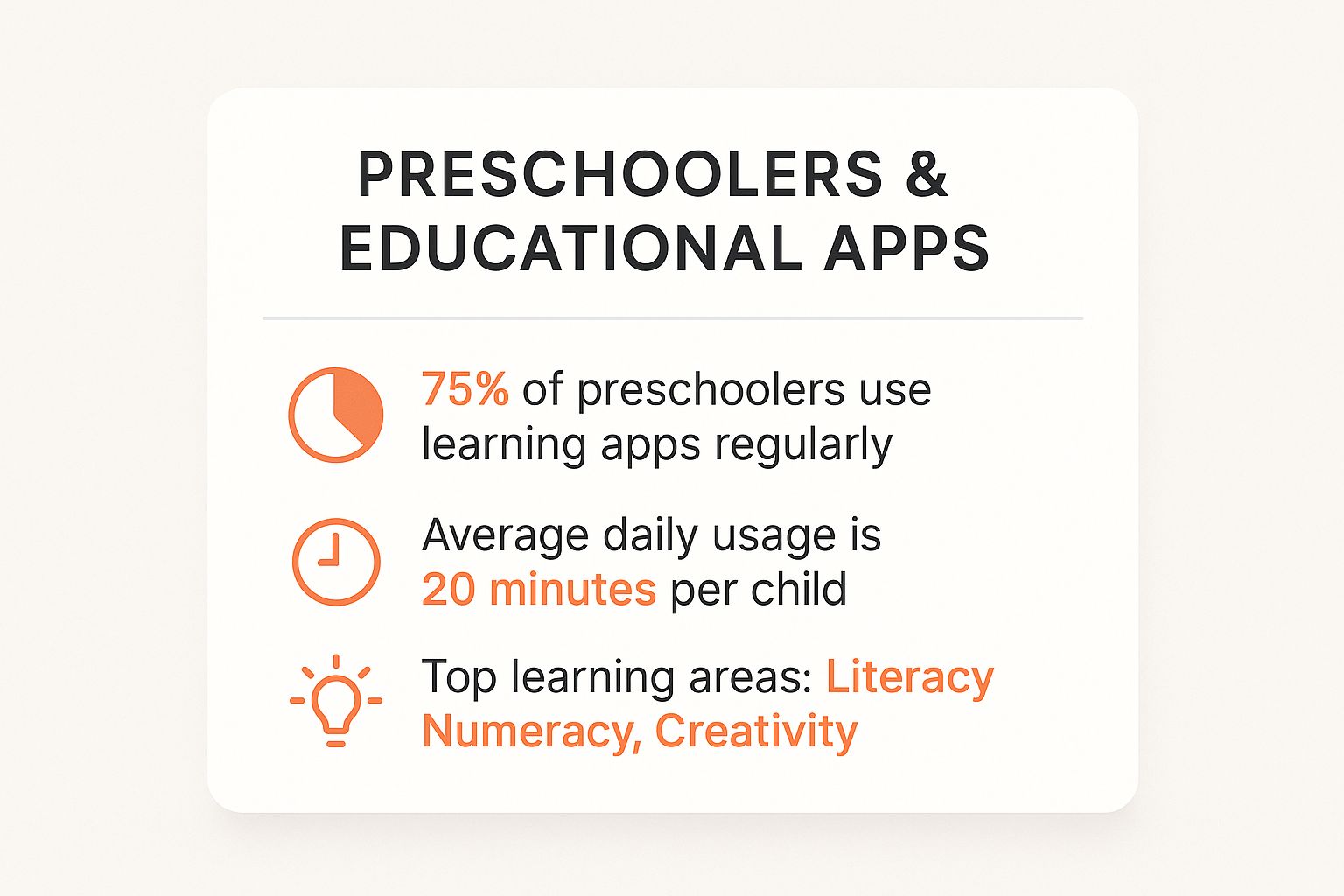
This data proves that educational apps are already a huge part of a preschooler's world, making it more critical than ever to choose wisely.
Making Confident Choices
So, how do you cut through the noise and find the apps that deliver real value? The secret is to look for experiences that prioritize storytelling and meaningful decision-making over simple, repetitive rewards. An app that helps your child navigate a character’s fear of the dark is teaching them empathy and bravery—skills that translate directly into their real-world experiences, like sleeping in their own bed all night.
It’s in these moments that an app becomes more than a game. It becomes a partner in your child's development and, for you, a source of that coveted guilt-free peace.
Quick Guide to High-Quality Educational App Features
Feeling a little lost? Let me make it easier for you. I’ve put together a quick-reference table—think of it as your cheat sheet for the app store. Use it to spot the key features that signal a top-tier learning experience for your little one.
| Feature | Why It Matters for Your Child | What to Look For |
|---|---|---|
| Interactive Storytelling | Puts your child in the driver's seat, teaching cause and effect while building confidence. | Look for apps with branching narratives or "choose-your-own-adventure" style stories. |
| Play-Based Learning | Taps into a child's natural desire to play, making learning feel like fun, not a chore. | The app should feature games, puzzles, or creative tasks that teach concepts organically. |
| Focus on Core Values | Goes beyond academics to teach crucial life skills like empathy, kindness, and resilience. | Check app descriptions for mentions of emotional growth, social skills, or character-building. |
| Child-Safe Design | Ensures a worry-free experience without ads, in-app purchases, or external links. | Look for "kid-safe" certifications or clear policies on privacy and advertising. |
| Age-Appropriate Content | The challenges and concepts should be just right for your preschooler—not too easy, not too hard. | The app should clearly state its target age range (e.g., ages 3-5). |
Remember, the goal isn't just to keep them busy. It’s to provide an experience that helps them grow into thoughtful, resilient little humans. With this guide, you can feel confident you’re picking apps that truly nurture your child’s incredible, developing mind.
What to Look for in a Great Preschool Learning App
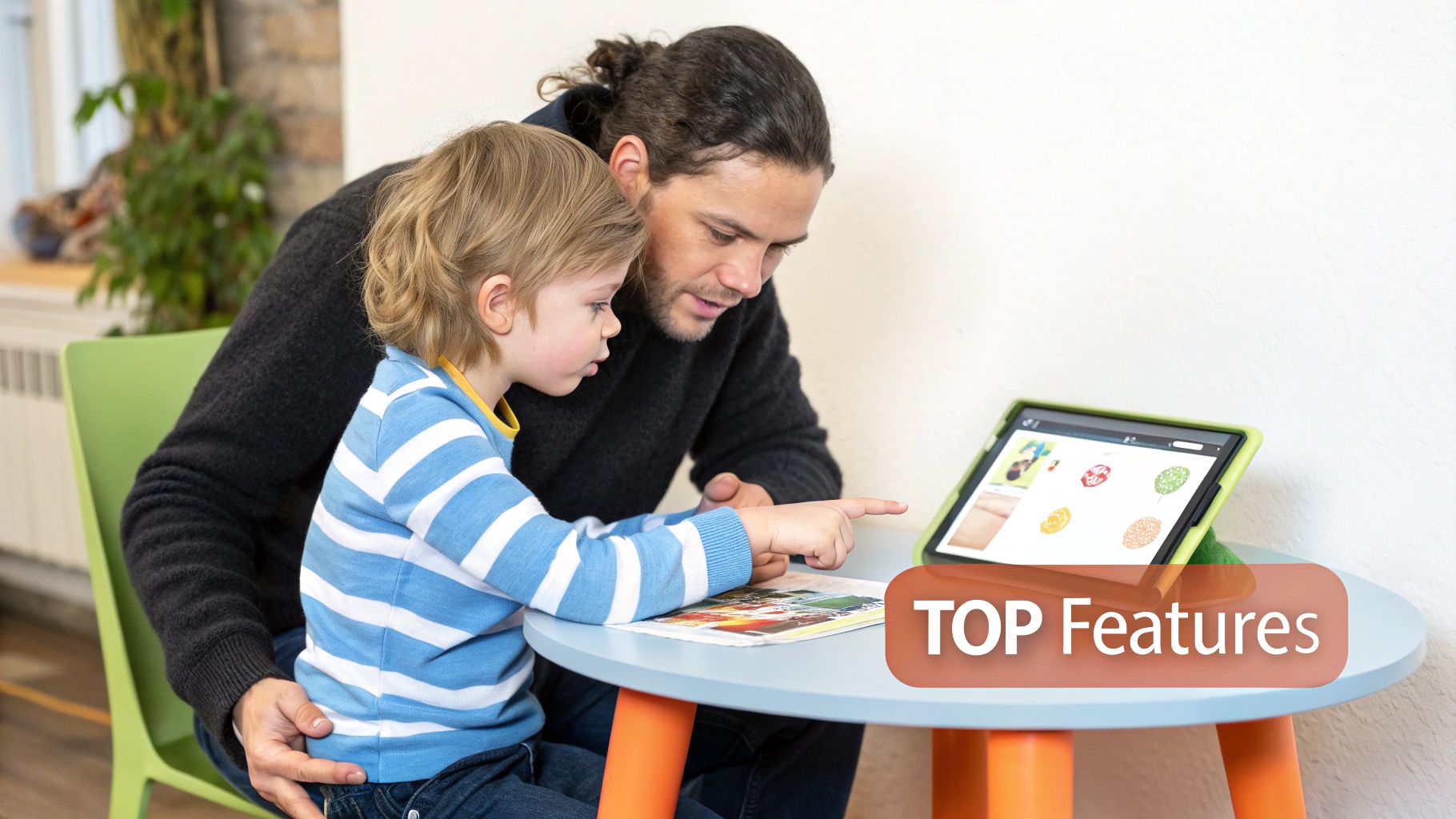
So, what separates the digital equivalent of a home-cooked meal from digital junk food? It’s not about flashy animations or catchy songs. The best educational apps for preschoolers are designed with a deep respect for your child’s developing mind.
When you’re browsing, it’s tempting to download the app promising to make your child a "genius." But let's be real—your goal is to nurture their natural curiosity and build a strong foundation, not fast-track them to college. This means looking past the marketing fluff at a few non-negotiable features that create a safe, enriching space for them to explore.
Start With a Safe, Ad-Free Environment
Imagine reading a beautiful picture book with your child, and right at the story’s climax, a loud toy commercial pops up. You'd never stand for that, right? The same rule must apply to their digital world. An app loaded with ads isn't just annoying; it’s a direct threat to your child's focus.
A 100% ad-free environment is your first and most crucial checkpoint. This ensures your preschooler isn't being marketed to or accidentally clicking on something that yanks them out of the app. It's about protecting their attention and creating a calm, uninterrupted sanctuary where their imagination can flourish. This is a core principle behind apps like Lunesia, where the entire experience is built just for them—no pop-ups, no commercials, no tricks.
Choosing an ad-free app isn't just about avoiding distractions. It's about protecting your child's impressionable mind from commercial messaging and creating a sanctuary for pure, uninterrupted learning and play.
Prioritize Child-Friendly Navigation
Ever watched your little one get red-faced with frustration trying to work a toy with too many complicated buttons? The same meltdown happens with poorly designed apps. If an app requires you to constantly step in to fix something, it defeats the purpose of fostering independent play.
Great educational apps feel intuitive to a small child. This means big, clear buttons, simple visual cues, and a flow that makes sense to them. When your child can navigate an app on their own, it builds a powerful sense of competence. They learn, "I can do this myself!"—a feeling that becomes a cornerstone for all future learning.
This is a key consideration as the global market for preschool education software grows, projected to hit $25 billion by 2033. As more options flood the market, savvy parents are looking for quality and usability, not just a mountain of content.
Seek Out Interactive, Play-Based Learning
Ready for the real magic? The best learning isn't about memorizing facts; it's about experiencing them. Many apps boil down to simple tap-and-reward mechanics—get the answer right, see a star flash. While that has its place, it’s a surface-level interaction.
Truly great educational apps for preschoolers go much deeper. They embrace interactive, play-based learning where children are active participants, not just passive consumers. Think of it as the difference between watching a cooking show and actually getting your hands messy mixing the ingredients yourself.
This is where Lunesia truly shines. Instead of just listening to a story, your child makes decisions that shape the entire adventure. When a character is scared to cross a rickety bridge, your child chooses whether to encourage them or find another way. They aren't just hearing about courage; they are actively practicing it. These aren’t just bedtime stories—they’re dynamic journeys that build critical thinking and empathy with every choice. For a more detailed guide on this topic, check out our article on how to evaluate educational apps for your child.
When evaluating app features, consider how apps leveraging the benefits of read-aloud books with Text-to-Speech can significantly enhance a child's early literacy and engagement. It's another layer that transforms a simple story into a rich, multi-sensory learning experience.
Building Emotional Intelligence Beyond ABCs and 123s
We all want our kids to nail their letters and numbers, but have you ever stopped to think about what really sets them up for a happy, successful life? Academic skills are important, of course. But a child’s emotional well-being? That’s the foundation everything else rests on. Can an app, of all things, actually help build that foundation?
I was skeptical at first, too. But the answer is a resounding yes—if it’s designed with heart. The right digital experience can be a powerful, and surprisingly safe, playground for practicing how to handle big feelings.
A Safe Space to Practice Big Feelings
Think about those moments that throw our little ones for a loop. The nervous tummy jitters before their first day of school. The sudden, overwhelming fear of a dark room at bedtime. As parents, our instinct is to talk them through it, but what if they had a way to practice being brave before the real-life challenge even hits?
This is where interactive storytelling completely changes the game. Unlike a passive cartoon, a story that asks for your child's input gives them a sandbox to explore tricky emotions. They get to see a problem from a safe distance and test out different solutions without any real-world consequences.
For instance, an app like Lunesia doesn’t just tell a story about a scared character. It presents a scenario—say, a timid rabbit needs to cross a wobbly bridge—and then asks your child, "What should we do to help?" By making a choice, your child isn't just a spectator; they become an active participant in problem-solving and empathy.
When children make decisions for a character, they're doing so much more than just tapping a screen. They are rehearsing kindness, practicing courage, and learning that their choices have the power to help others.
This kind of engagement is absolutely critical. It might surprise you to learn that a staggering 85% of our financial success is tied to skills in "human engineering"—things like personality, communication, and leadership. Nurturing these emotional skills early is one of the greatest gifts we can give our kids.
From Tantrums to Talking It Out
Let’s get real for a minute and talk about tantrums. That sudden explosion usually happens because a preschooler is bursting with a massive feeling but doesn't have the words or tools to express it. What if an app could help build that toolkit? When a child repeatedly helps a story character navigate frustration or disappointment, they’re actually learning emotional vocabulary and coping strategies themselves.
Imagine your child is playing a Lunesia adventure where a little fox gets mad because his block tower fell over. Your child gets to choose how the fox responds: Does he stomp his feet and yell, or does he take a deep breath and try again? Seeing these scenarios play out helps them connect actions to outcomes in a way that just telling them never could.
This digital practice can translate directly into real life. The next time their own LEGO tower tumbles, you have a shared experience to draw from. You can say, "Hey, remember what the little fox did? Let's try taking a deep breath together." It transforms a moment of frustration into a powerful, teachable one.
The Bonus for You: Guilt-Free Peace
And now for the part that matters just as much: you, the parent. While your child is immersed in a meaningful adventure—learning to be kind, brave, and resilient in a completely safe, ad-free world—you get a moment back for yourself.
This isn’t about parking your kid in front of a screen to zone out. It’s about choosing a tool that actively contributes to their emotional growth. You can finally finish that hot cup of coffee, send that important email, or just sit in silence for five glorious minutes. You can do it all without a shred of guilt, knowing your child isn't just being entertained. They're learning, growing, and becoming a more emotionally intelligent little person, all while you recharge. That’s a true win-win.
The Hidden Perk: Guilt-Free Time for You
Let’s be honest, parent to parent. We live for the magical moments—the bedtime snuggles, the belly laughs, the sidewalk chalk masterpieces. But parenting a preschooler is a marathon, not a sprint, and sometimes you just need five minutes to hear your own thoughts.
What usually happens in those moments? You might hand over a screen, and an instant wave of guilt crashes over you. Is this the right move? Am I just using a digital babysitter? That feeling is heavy, and it can completely ruin the very break you so desperately need.
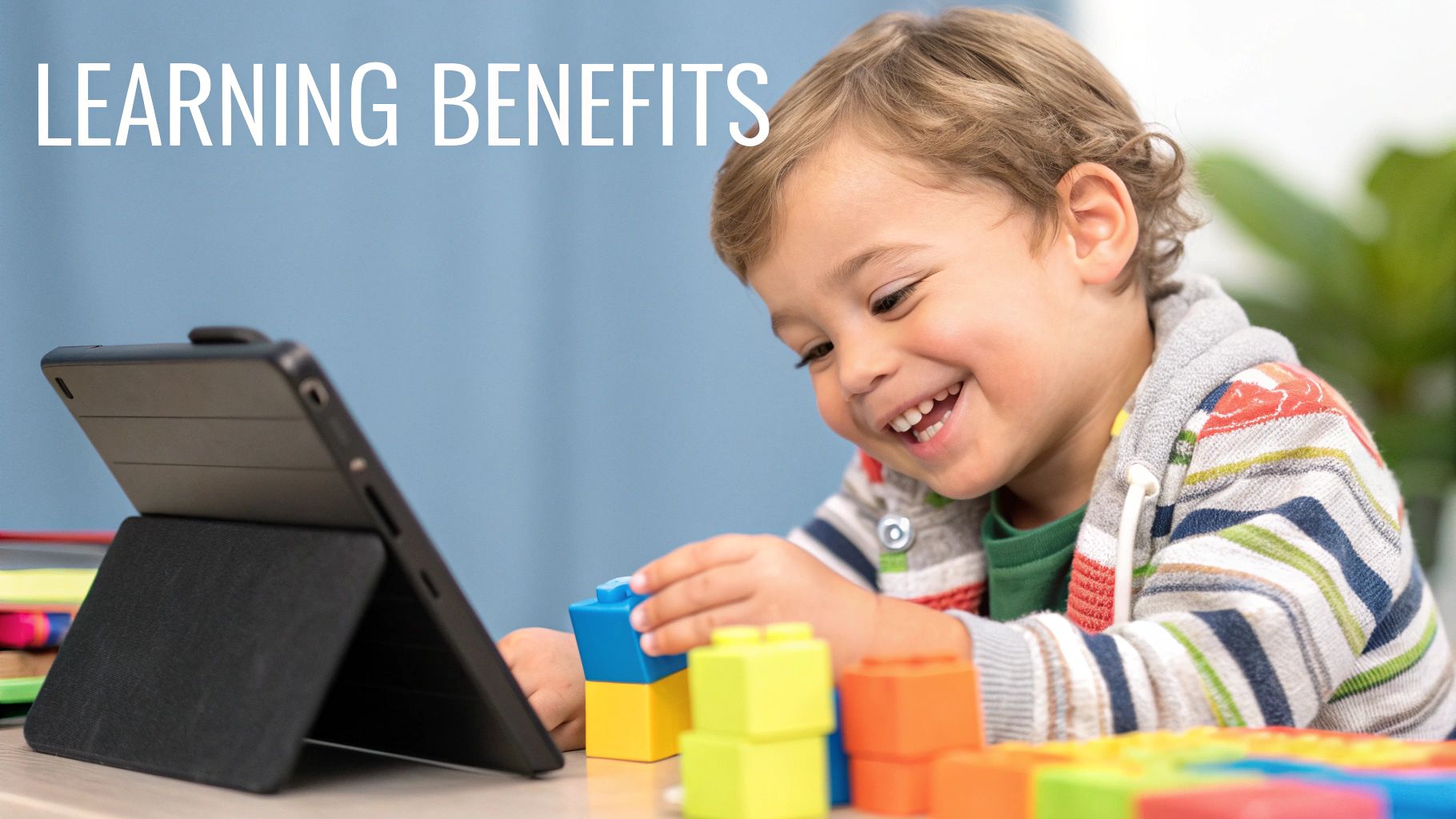
But what if you could rewrite that narrative entirely? What if that screen time wasn’t a compromise, but a brilliant, strategic win-win for both of you?
Transforming Screen Time into Your Time
Picture this: your little one is completely captivated, not by a flashy, overstimulating cartoon, but by a gentle, engaging adventure. They’re giggling as they help a little squirrel figure out how to share its acorns or bravely guide a friendly dragon through a forest. They’re safe, they’re learning, and most importantly, they’re happy.
And you? You're finally sipping your coffee while it's still hot. You're firing off that one important email you've been putting off all day. Or maybe, just maybe, you're sitting in blissful silence, feeling your shoulders drop an inch away from your ears.
This isn’t a fantasy. This is what happens when you choose high-quality educational apps for preschoolers. This isn't about distraction; it's about enrichment. You’re not just buying time; you’re investing in a meaningful, independent learning experience that also gives you the breathing room you deserve. The guilt just melts away.
When your child is immersed in a safe, ad-free app that nurtures their emotional growth, you aren't just getting a break. You're getting a well-deserved moment to recharge, knowing they are engaged in something truly beneficial. It’s self-care without the compromise.
The Power of a Guilt-Free Pause
That little pause is more powerful than you might think. When you’re constantly running on empty, it’s impossible to be the patient, present parent you want to be. Those small pockets of peace are your chance to recharge your own battery so you can come back to parenting with renewed energy and joy.
This is especially true with apps designed to foster emotional intelligence. Think about how Lunesia helps children navigate big feelings like fear or anxiety through its interactive stories. While your child is practicing how to be brave in a story, you're practicing something just as vital: taking care of yourself. You can learn more about striking this balance in our guide to guilt-free screen time with Lunesia.
Here’s what that guilt-free time can look like in real life:
- Morning Calm: Instead of a chaotic rush, you get 15 minutes to plan your day while your child helps a character solve a morning puzzle.
- Meal Prep Peace: You can actually chop vegetables with two hands while your little one is on an adventure, learning about kindness.
- The Post-Nap Reset: That tricky hour after naptime becomes a quiet moment for them to wind down with a story, giving you a chance to reset before the evening rush.
Ultimately, choosing the right educational apps for preschoolers isn't just about their development. It’s also a powerful act of self-preservation that makes the beautiful, messy journey of parenthood just a little bit easier. You get to feel more balanced and in control, all while knowing your child is safe, happy, and learning valuable life skills.
Turning Screen Time into Connection Time
Ever hand over a tablet and feel a little disconnected? What if that quiet time didn't have to be a solo mission for your child? With a small shift in approach, you can transform screen time into a powerful bonding experience. The trick isn't to banish screens, but to jump into the digital world with them.
When you become their co-pilot on a digital journey, solo screen time becomes a shared discovery. It’s a simple change that makes a world of difference, helping the lessons they learn on-screen stick around long after the device is turned off.
The Magic of Playing Together
Have you ever sat down and explored an app with your child? This simple act, often called co-playing, is one of the best ways to supercharge their learning. Instead of just watching from across the room, you become part of the adventure. You'll be amazed by what you discover about how your little one thinks and solves problems.
When you play together, you're sending a powerful message: "What you're doing is important, and I want to share it with you." This validates their interests and strengthens your bond. It also gives you a front-row seat to the skills they’re building, whether it's figuring out a tricky puzzle or making a big decision for a story character.
Connecting the Dots: From the Screen to Real Life
Want to know the secret to making learning stick? Help your child build a bridge from what they see on screen to the world right in front of them. It all comes down to asking thoughtful, open-ended questions that get them talking. This is where an app like Lunesia becomes more than just a game—it becomes a conversation starter.
Lunesia's stories are built around choices that teach kindness, courage, and empathy, making them the perfect springboard for meaningful chats. After an adventure wraps up, you can gently guide the conversation from the screen back into your world.
Here are a few practical examples you can try after finishing a Lunesia story:
- To Teach Empathy: "Wow, the little fox looked so sad when his tower fell. What do you think would have made him feel better?"
- To Encourage Bravery: "That was a pretty wobbly bridge! Why do you think the bunny decided to cross it anyway? What makes you feel brave?"
- To Discuss Kindness: "Why did the bear share his honey with his friends? Was that a kind thing to do? Can you think of a time you were kind today?"
These simple questions do more than just recap the story. They help your child take big ideas—like empathy and courage—and see how they fit into their own life.
When you ask "why" and "what if," you're not just talking about a story. You're helping your child build the mental wiring for critical thinking and moral reasoning. Those are skills that will stick with them for a lifetime.
Building a Healthy "Digital Diet"
Of course, meaningful screen time is just one ingredient in a healthy childhood. Think of it like a balanced diet. You wouldn't feed your child only one type of food, and the same goes for their daily activities. Educational apps for preschoolers should complement, not replace, all the other amazing ways kids play and learn.
Try to set clear, consistent boundaries around screen time. Maybe it's 20 minutes while you're making dinner or a special story before bed. Having a predictable routine helps kids understand that screen time is a specific activity, not an endless default. This balanced approach is becoming more crucial as digital tools become a bigger part of early learning. In fact, the preschool education software market, valued at around USD 2.5 billion, is projected to nearly double by 2033. You can dig into more data on the growth of preschool education software.
By jumping in to co-play, asking great questions, and setting simple limits, you can transform screen time from a source of worry into one of the most valuable tools in your parenting toolkit.
Why Lunesia is a Choice Parents and Kids Love
With so many educational apps out there, what makes one truly stand out? It isn’t about having the most stories or the flashiest animations. It’s about finding an experience that feels like it was designed just for your child—and with your family’s peace of mind at its core.
This is where Lunesia goes from being just another app to a genuine partner in your child's growth. It’s a thoughtfully created world where kids don’t just passively listen; they step right into the story. It's an active, empowering adventure where your child becomes the hero, making choices that change how the story unfolds.
They Aren't Just Stories, They Are Life Rehearsals
Think about a common fear your preschooler might have, like being scared of a thunderstorm. A typical story might just say, "The little bear was scared, but then he was brave." That’s nice, but it’s passive.
In a Lunesia adventure, your child is right there with that bear, actively helping. They get to choose: do we sing a brave song together, or should we build a super cozy blanket fort to feel safe?
By making that choice, your child is doing something incredibly powerful. They’re practicing empathy, problem-solving, and courage in a safe, imaginative space. This is how real-world emotional resilience is built. They aren’t just being told how to be brave; they’re rehearsing it.
This interactive format turns storytelling from a one-way lecture into a dynamic conversation. It empowers children, showing them that their choices matter and that they have the inner strength to navigate challenges—a lesson that sticks long after the screen is off.
When your child is the one calling the shots, they build a sense of confidence that spills over into their everyday life. That's the heart of what makes Lunesia such a powerful tool. You can dive deeper into the specific educational benefits of Lunesia for preschoolers to see exactly how it supports their growing minds.
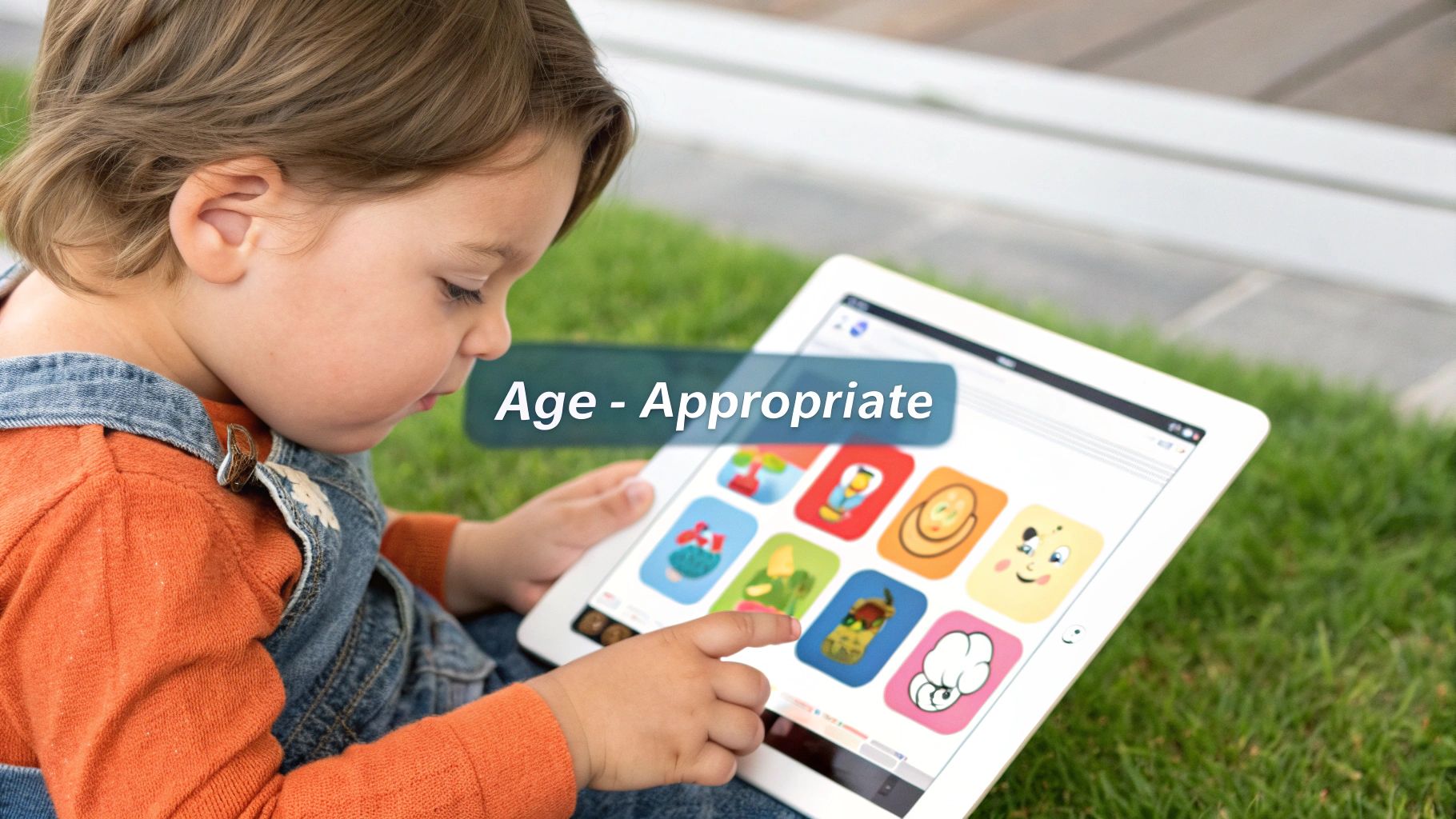
A Safe Harbor for Them, a Peaceful Moment for You
As a parent, you know nothing matters more than safety. Lunesia was built from the ground up to be a secure, 100% ad-free sanctuary. You’ll never find pop-ups, tricky third-party links, or in-app purchase prompts designed to frustrate your child. With a recent study finding that nearly 70% of parents worry about the ads their kids see online, a completely clean experience is more important than ever.
And while your child is safely lost in a meaningful adventure—learning about kindness from a generous fox or courage from a dragon who’s scared of heights—you get something priceless in return: guilt-free time.
This isn’t the empty quiet you get from a mindless video. It's the deep peace that comes from knowing they are engaged in something genuinely good for them. It’s the freedom to finish your coffee, answer an email, or just close your eyes for five minutes, knowing you've made a smart, heartfelt choice for their development. It's the ultimate win-win.
Frequently Asked Questions
Diving into the world of educational apps for preschoolers naturally brings up a lot of questions. You want to do what’s best for your little one, and it's totally normal to feel a bit overwhelmed. Let's walk through some of the most common concerns and get you clear, practical answers you can feel good about.
What is the Right Amount of Screen Time?
This is the big one, isn't it? The truth is, there's no single magic number. Instead of obsessing over the clock, I encourage parents to shift their focus to the quality of the content.
Think of it this way: twenty minutes spent on an interactive story that teaches problem-solving is worlds away from an hour of passively watching random videos. The first is active engagement; the second is digital babysitting.
A great practical tip is to treat apps as a specific tool for a specific job. For example, use an app like Lunesia for a 15-minute cool-down after a wild afternoon of play, or as a special interactive bedtime story. This frames screen time as a structured, meaningful activity, not an endless distraction.
How Do I Handle Tantrums When Screen Time Ends?
Ah, the dreaded transition. We've all been there. The key to navigating this moment is consistency and communication. Giving your child a simple heads-up before it's time to turn off the device can work wonders.
Try this practical tip: say, "We have five more minutes to help the little bear finish his adventure!" It prepares them for what’s coming next and gives them a sense of control.
If a tantrum still erupts, it's often a sign of big feelings they can't yet put into words. This is where apps that teach emotional intelligence really pay off. You can connect the moment back to their digital experience: "I know you're frustrated. Remember how the little fox in our story took a deep breath when he felt that way? Let's try it together." Suddenly, a moment of conflict becomes a real-world chance to practice the very skills they’re learning.
Are There Other Digital Tools That Can Help Parents?
Absolutely. While our focus here is on enriching your child's learning journey, you’re juggling a million things at once. It's no surprise that many parents rely on digital tools for family management and organization.
For instance, for those in shared parenting situations, there are even apps specifically designed for co-parenting or divorced parents. Just as a good educational app creates a positive environment for your child, the right organizational tools can bring a sense of calm and predictability to your family life—a win for everyone.
Ready to turn screen time into a magical, guilt-free learning adventure? See how Lunesia helps your child build confidence, kindness, and courage, one interactive story at a time. Start your free trial today and watch your little hero's imagination take flight!
